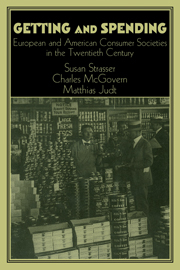Book contents
- Frontmatter
- Introduction
- Part One Politics, Markets, and the State
- Part Two Everyday Life
- 9 World War I and the Creation of Desire for Automobiles in Germany
- 10 Gender, Generation, and Consumption in the United States: Working-Class Families in the Interwar Period
- 11 Comparing Apples and Oranges: Housewives and the Politics of Consumption in Interwar Germany
- 12 “The Convenience Is Out of This World”: The Garbage Disposer and American Consumer Culture
- 13 Consumer Culture in the GDR, or How the Struggle for Antimodernity Was Lost on the Battleground of Consumer Culture
- 14 Changes in Consumption as Social Practice in West Germany During the 1950s
- 15 Reshaping Shopping Environments: The Competition Between the City of Boston and Its Suburbs
- 16 Toys, Socialization, and the Commodification of Play
- 17 The “Syndrome of the 1950s” in Switzerland: Cheap Energy, Mass Consumption, and the Environment
- 18 Reflecting on Ethnic Imagery in the Landscape of Commerce, 1945-1975
- Part Three History and Theory
- Index
13 - Consumer Culture in the GDR, or How the Struggle for Antimodernity Was Lost on the Battleground of Consumer Culture
Published online by Cambridge University Press: 05 January 2013
- Frontmatter
- Introduction
- Part One Politics, Markets, and the State
- Part Two Everyday Life
- 9 World War I and the Creation of Desire for Automobiles in Germany
- 10 Gender, Generation, and Consumption in the United States: Working-Class Families in the Interwar Period
- 11 Comparing Apples and Oranges: Housewives and the Politics of Consumption in Interwar Germany
- 12 “The Convenience Is Out of This World”: The Garbage Disposer and American Consumer Culture
- 13 Consumer Culture in the GDR, or How the Struggle for Antimodernity Was Lost on the Battleground of Consumer Culture
- 14 Changes in Consumption as Social Practice in West Germany During the 1950s
- 15 Reshaping Shopping Environments: The Competition Between the City of Boston and Its Suburbs
- 16 Toys, Socialization, and the Commodification of Play
- 17 The “Syndrome of the 1950s” in Switzerland: Cheap Energy, Mass Consumption, and the Environment
- 18 Reflecting on Ethnic Imagery in the Landscape of Commerce, 1945-1975
- Part Three History and Theory
- Index
Summary
Those who know me know that I have drunk lots of water and hardly any wine, not to mention vodka or cognac. I really cannot speak of a feudal life, though I could have afforded one on my salary. Every morning I had one or two rolls with butter and honey, at lunch time we were in the Central Committee building and there I had either a grilled sausage with mashed potatoes or macaroni with bacon or goulash. In the evening I stayed at home, watched a bit of television and went to bed. . . . I have to say that it was my lot in life to live modestly and thereby maintain my performance. That way I never lost contact with the people, though security guards and others often created a situation where I was separated from the masses. But I always had direct contact with the masses in spite of it.
Clearly, this man did not need much to live on. He was not a pleasure seeker. He was an ascetic. But since when have people loved ascetics?
If Erich Honecker felt compelled to describe himself as a modest and unpretentious sovereign in this conversation with Reinhold Andert and Wolfgang Herzberg, he was reacting above all to a call to do away with privileges for party bureaucrats that was raised during the Wende. In his most recent analysis of the elite of the former German Democratic Republic (GDR), Michael Bodemann found that they all claimed that they did not enjoy special privileges. But their insistence that they lived just like “normal” citizens of the GDR was more deeply rooted, and not just a current strategy for self-justification.
- Type
- Chapter
- Information
- Getting and SpendingEuropean and American Consumer Societies in the Twentieth Century, pp. 281 - 300Publisher: Cambridge University PressPrint publication year: 1998
- 27
- Cited by



